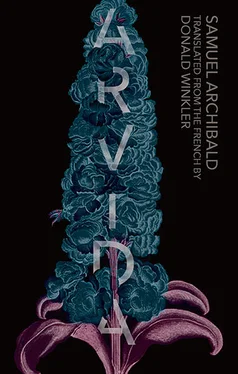Once, at the hour when the oldsters ought to be retiring to read in bed and the youngsters heading to sleep, my father, without anyone noticing, slipped into the sideboard next to the dining room table, installed himself like a contortionist, and closed himself in. His plan having succeeded, he waited patiently for the evening to reveal its secrets.
In vain.
Made bold by drink, my grandfather, Mister Belinak, and Mister Addams had no more to exchange than dirty jokes, which might have interested my father were he two or three years older. For the time being he understood nothing at all.
The men talked in a kind of drunken Esperanto composed of mispronounced fragments of each other’s language, belches, and slaps on the back. My father fell asleep, not knowing that the latch on the door he’d closed was holding him prisoner. It was apparently a good latch, which stood in the way of a logical course of events. Under normal circumstances, my father, his weight bearing forward as he lapsed into sleep, would have forced open the door and fallen to the floor with a thump in front of the guests. Instead, the latch held true, and it was the entire dish-laden cabinet high on its legs that my father dragged with him in his descent. It crashed down on the table, exploding in all directions in splinters of wood and broken glass, almost killing Mister Belinak by fracturing his skull or giving him a heart attack. The men, who had jumped up in unison, stood there dazed for several seconds, before hearing a child weeping beneath the debris.
Usually the story ended there. But on one occasion my father thought good to add this addendum.
We were in the woods, just the two of us, and he said:
“Welsh, my ass. Addams, his real name was Himmler or Goebbels. And Mister Belinak liked him even if he’d killed all his brothers and sisters.”
*
The revelation was doubtless apocryphal and a bit forced, but it said what there was to say about our town, that it was a place of refuge where almost everything could be wiped away and forgotten.
Arvida was a town for second chances, undue hopes, and also games.
My grandparents themselves had landed up there in part to hide from their families a shameful secret. My grandfather was a pious man who hadn’t sworn twice in his life. He said his rosary at night like an old woman knits. He was a miracle-worker his friends and family phoned from all over, because his prayers stopped bleeding, cured migraines, and helped find lost objects.
The Lord was his shepherd, but my grandfather wasn’t made of wood. By subtracting the date of my uncle Clinton’s birth from the date of his marriage in the church of Sainte-Thérese, you got something like four months and a bit. My grandmother married pregnant, and my grandparents fled Beauport to expunge the original sin.
As my father said:
“Your grandfather didn’t want anyone to know that there was a bit of Rasputin in our saintly Brother André.”
*
My grandfather was also a great athlete, and that’s what got him invited to Arvida.
It was before colour television and the big networks, Hockey Night and all the tralala, at a time when people had to get their entertainment locally. People in Arvida were mad for sports, outdoor or indoor. They played baseball and softball in the summer. They skated in winter. And all year long you could bowl, see hockey games, or watch wrestling matches at the Community Centre. In the park in front of the big sports complex, you could walk around or sit on a bench in front of a big grandstand where bands and orchestras played.
My grandfather was taken on by Monsieur Latraverse, who was the foreman in Alcan’s painting shop, and also a hockey coach. For two years he played hockey all winter and softball all summer, before being hired as an industrial painter in the factory. From then on, my family’s destiny was closely bound to this town of leisure and forgetfulness, where anyone could become a saint after having sinned, and where you could achieve local fame as an athlete while waiting for someone to give you a real job.
For a long time, everything went well.
Clinton was born on September 3, 1947.
Hélène on October 20, 1949.
Lise on March 11, 1951.
Douglas, my father, on November 17, 1954.
Georges on May 12, 1956.
Terry, my godfather, on May 25, 1962.
All were good children, and were raised to attend Mass twice a day out of respect for one canonical trinity, and another made up of God, the Montreal Canadiens, and the New York Yankees.
The family flourished in pace with the town, the children grew older, and when they were of an age, the three oldest went off to university.
Signs of exhaustion then began to manifest themselves.
At the age of thirty-nine, my grandmother fell victim to an inexplicable glaucoma and had to be operated on several times so as not to become blind. The operations weakened her considerably, and became more and more delicate, even life-threatening. For weeks, the wives of the bosses and workers delivered food to the terrified husband and children.
During the summer of love, in 1967, my uncle Georges, twelve years old, lost a tooth during the night. Instead of swallowing it, as happens in most such cases, he breathed in the tooth, which rattled around dangerously inside his lungs. He nearly died, and when he recovered, it was to learn that his kidneys were in very bad shape.
It was said that my grandfather never got over that.
My uncle Georges was the quintessence of the Archibald family. He was as bright and studious as the girls, as good a communicator as Clinton, and as brainy, when he applied himself, as Terry, the youngest. He had my father’s gift of the gab, and even surpassed him in sports.3
It’s always a bad omen for a family to see fate bear down on its most illustrious member. The wind was shifting, it’s clear, but no one saw it. When he left the hospital, Georges shut himself up in his room and had himself brought down in his armchair to go and pass, hands down, the Ministry exams, making up in a few months all he’d missed over almost two years. He then went back to his room for five months, and to prove the doctors wrong who’d said that he’d never walk again, he came downstairs under his own steam at Christmas and celebrated New Year’s on his feet. In many ways, he’d come to embody the Archibald family’s resilience.
And so even if the curse was upon them, my grandparents thought that everything would work out. Georges was getting better. Their older children began to have children of their own. Not even twenty-five years old, my father, the most typical Arvidian of the lot, was making money hand over fist with his Bojeans boutiques and his wagers on golf. He owned about half of the hockey and baseball teams in town. Twice a week he went up to Quebec City with Georges for his dialysis. He left him at the Laval University hospital, headed for Montreal to pick up jeans from his warehouses, then returned to the Saguenay, picking up Georges on the way. To entertain us, he brought back from the Parc des Laurentides terrifying stories of hitchhikers glimpsed in the wan morning hours, or of strange lights in the sky.
*
It’s important to underline: this town whose years of glory I celebrate, I myself only knew it in decline, along with the decline of my own family.
In 1978, the year of my birth, Arvida was administratively fused with Jonquière. On the ground everything looked the same, but its status had changed.
Arvida, a town unto itself, and a model city, no longer existed.
The same year saw both the town’s apotheosis and its swan song, a brief burst of brightness at a time when its future was already darkening.
Pierre-Paul Parent, alias Pitou, my father’s henchman and my uncle, so to speak, along with the O’Keefe representative Roland Hébert, organized a hockey match that would pitch former Montreal Canadiens against the stars of Arvida’s commercial league. Pitou owned the Station, a fashionable bar at the time, which occupied a handsome building on the Rue de Neuville that had once been the Arvida railway station, and today is a funeral home.
Читать дальше












